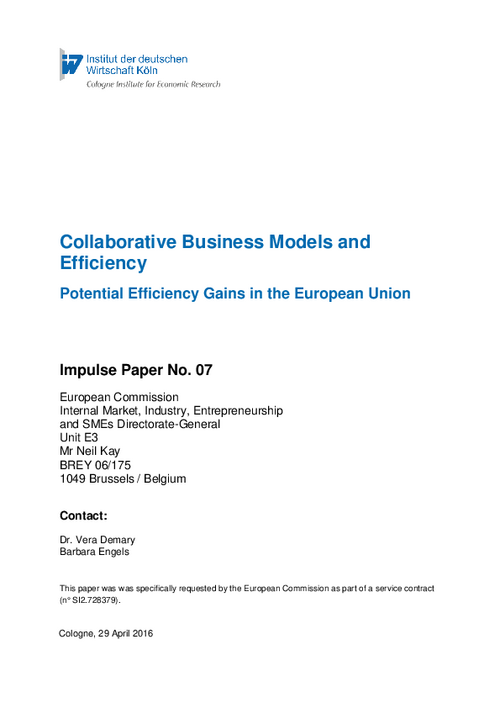Impulse Paper for the European Commission

Collaborative Business Models and Efficiency: Potential Efficiency Gains in the European Union
Impulse Paper No. 07 for the European Commission, Internal Market, Industry, Entrepreneurship and SMEs Directorate-General

Impulse Paper for the European Commission
With the advent of the all-embracing digitization, the internet-based collaborative economy, which harnesses the power of technology to connect people in transactions, is on the rise. It provides services in a different way than traditional economies: Traditional service providers typically adopt a pipe-like business model, employing staff within a single enterprise to supply a service directly to a particular segment of the market. The collaborative economy, by contrast, mainly consists of peer-to-peer (P2P) online platforms, which are characterized by networkbased business models. The tremendous success of many collaborative platforms might be indicative of substantial efficiency gains that can be realized in collaborative business models, but not in traditional business models. The purpose of this impulse paper is twofold:
First, it examines whether there are efficiency gains in the collaborative economy by carrying out a comparative analysis of the business model of a collaborative platform and a traditional enterprise providing broadly the same service. Second, given the efficiency gains realized in the collaborative economy, the growth trajectories of a US-based and of a European collaborative platform are compared in order to single out potential barriers arising in the EU environment. Based on these barriers, policy recommendations are provided that could foster the growth of collaborative platforms and thereby the realization of efficiency gains.

Vera Demary / Barbara Engels: Collaborative Business Models and Efficiency – Potential Efficiency Gains in the European Union
Impulse Paper No. 07 for the European Commission, Internal Market, Industry, Entrepreneurship and SMEs Directorate-General


Nachhaltigkeitsbericht: ja, aber wie?
Die Europäische Union verpflichtet mit verschiedenen neuen Vorschriften immer mehr Unternehmen dazu, ihre Aktivitäten in Sachen Nachhaltigkeit offenzulegen. Manche Unternehmen erstellen auch bereits auf freiwilliger Basis Nachhaltigkeitsberichte.
IW
„Europa bietet Chancen für mehr Wettbewerb und weniger Bürokratie. Das sollten wir nutzen“
Was bedeuten die Ergebnisse der Europawahl für die Wirtschaft? Im Handelsblatt-Podcast „Economic Challenges“ diskutieren IW-Direktor Michael Hüther und HRI-Präsident Bert Rürup die Folgen der Wahl und warum jetzt Wettbewerbsfähigkeit statt Green-Deal im Fokus ...
IW